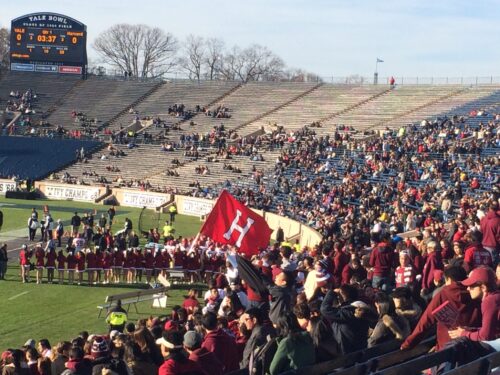Football and the mission of Harvard.
In the festivities leading up to this weekend’s 134th playing of The Game, I came across a column published in the Chicago Tribune by Steve Chapman on November 10th of this year. Titled “Harvard and Yale should stop playing football,” the piece presents Chapman’s argument that the increased risk of injury in college football today is too great a risk to the health of students and the mission of the colleges. He states, “It’s the equivalent of the Mayo Clinic operating a tobacco shop on-site.” Chapman is not alone in his condemnation of football as more dangerous than it is valuable for our country’s collegiate minds. But while the evidence of danger is clear, the steps to prevent it are not quite so.

More and more popular research combined with the devastating examples of seriously injured players (including of The Crimson’s own, to whom our hearts and prayers go out) present a case for the end of football that we are loathe to ignore. Harvard, other colleges, and youth leagues continually make updates to the procedures in order to prevent injuries as best they can. At some point, however, we must ask: is it enough? Chapman points out that if Harvard and Yale take on the responsibility as leading institutions, more colleges will follow the example and stop playing football.
I believe this to be a difficult scenario to imagine. As the granddaughter of a Notre Dame football player and self-described jock, I understand the role football plays in American culture today. As the granddaughter of a man weakened by brain damage, I also understand the serious consequences of this culture. But how can Harvard and Yale use their roles as elite institutions to change this? Chapman believes we can lead by example, but I also wonder if a re-examination of Harvard’s mission as an institution is in order.
Another festive step in my pre-The Game ritual is the listening to Tom Lehrer’s satirical fight song, “Fight Fiercely Harvard.” Written while he was attending Harvard in 1945, the song contains such lyrics as, “Hurl that spheroid down the field!” alongside, “but don’t be rough now!” The humor in the stereotype of Harvard as a place for genteel individuals too civilized for savage play still finds a foothold today. But taken in light of Chapman’s piece, I question whether the focus on Harvard and Yale in the football debate signifies an uncomfortable concept: do people believe Harvard minds are inherently more valuable than others, and therefore worthier of protection from the harm of football?
To answer this question, I wish to instead focus on the mission of Harvard College. Does the institution of Harvard exist to mold and encourage brilliant citizens of the world? Do harmful head injuries reduce this potential of students? If the answer to both questions is yes, I find it difficult to advocate for a 135th playing of The Game.
Caroline Cronin (ccronin01@college.harvard.edu) will, despite these misgivings, stand alongside The Crimson and wish all a fun and well-played game this weekend!

